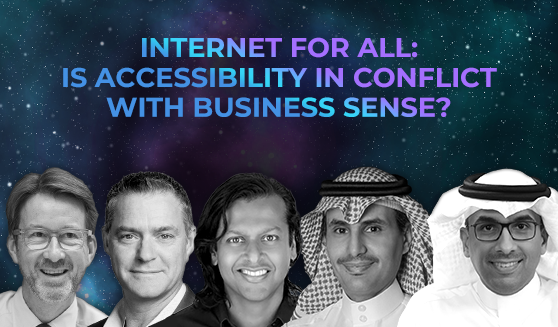
Is GenAI the key to building smarter cities?
Learn how generative AI is unlocking the true potential of digital twins – to make smart cities more efficient, inclusive, and citizen-focused.


Making connectivity accessible for everyone was an important theme at #LEAP22. Keynote speakers discussed how to make the internet accessible in geographical regions that have typically been left behind by tech; how to change the gender imbalance in the tech industry, and what that will mean for equality in the future; how to improve access for people with disabilities; and more.
It’s evident that we’re all in agreement: connectivity is important. Accessibility is important. But in order to drive accessibility and ensure the whole world can benefit from modern tech, we also have to care for the businesses that roll that technology out.
Lord Stephen Carter (Former Minister of Communications UK, and Group CEO at Informa PLC) was joined by Ahmed Al-Faifi (Managing Director at SAP Middle East); Alaa A. Malki (Chief Technology Officer at Mobily); Ricky Corker (Chief Customer Experience Officer at Nokia); and Hrish Lotlikar (Co-Founder and CEO at SuperWorld) to talk about how we can extend connectivity in an effective way.
And Corker made this crucial point: it has to work from a business perspective too.
Saudi Arabia is a leader in terms of national internet penetration – around 97.9% of the population has online access. “Today you can go in the middle of the desert and you can have a broadband experience,” Malki said, and “we saw how much this played a major role in the pandemic, how much this was a lifeline for people.”
This level of connectivity was achieved through collaboration between the government and the private sector, with key players from the government side including the Ministry of Communications and Information Technology (MCIT), responsible for policy development; the Communications and Information Technology Commission (CITC), which regulates the ICT and postal sectors; the Saudi Data and AI Authority (SDAIA), governing the nation’s data and AI agenda; and the National Cybersecurity Authority (NCA), which performs both regulatory and operational functions in the Kingdom.
Indeed, Malki added, “everyone deserves to have the internet,” – and it was widely agreed at #LEAP22 that connectivity has become a human right. For Malki, this means that “we have to serve the people. It’s not a matter of competition and pricing and all these things; you need to provide the connectivity. It’s a must.”
This idea that connectivity is a right, and that profits must be put aside in order to serve citizens and expand connectivity to the most under-served populations, is something we can absolutely agree with on the one hand. But on the other hand, we have to acknowledge that in the current market, connectivity is provided by profit-making businesses. It’s not (for the most part, in most of the world’s regions) funded by government subsidies, but by individual users paying private companies for access to the internet.
And those companies can’t give stuff away for free – it’s not how their businesses work. If they did, their businesses wouldn’t continue to work for very long. It takes a lot of funds to create internet products and provide connectivity, and as uptake grows, the profit margins are shrinking.
As Corker pointed out, “the real challenge for operators around the world is, how do I spend all that money, invest in those networks, and still get money out the other side.” Because on the operator side, “as traffic continues to grow exponentially the revenue remains relatively flat, and so we have to continually drive down costs.”
The answer will lie largely in regulatory and government intervention; on sharing the risk in order to ensure that companies investing in the tech – in expanding connectivity – will get a fair return. If connectivity is a human right then it’s a government issue as well as a tech industry issue. And to their credit, governments around the world are working on connectivity-boosting schemes – like Speed Up Britain in the UK, and the Smart Africa initiative that aims to make broadband affordable for more users on the African continent.
Government connectivity drives will be coupled with changes caused by new technology itself. The rollout of 5G, and the increasing affordability of metaverse technology (like AR glasses), will create new economic opportunities for digital users – and the resulting economic growth will (hopefully) have a positive impact on the bottom line of internet network operators. A new study by Grand View Research predicts that 5G network sales and associated services could generate as much as USD $23.8 billion by 2028 (with the surge in sales starting in China two years earlier than that). If 5G enables more enterprise, then it will become a revenue-generating platform; and operators can develop strategies to capture some of that revenue by providing on-platform services to their users.
Accessibility doesn’t have to be in conflict with business. Businesses don’t have to (and won’t) give away their products and services for free. But as it stands, under-served populations need more support from government schemes to increase their access – so they can take advantage of emerging technologies. In turn, with those technologies in their hands, they’ll be able to contribute to innovation and economic growth. Which (in theory at least) will be a win for everyone: citizens, businesses, and national GDP.

Learn how generative AI is unlocking the true potential of digital twins – to make smart cities more efficient, inclusive, and citizen-focused.

The smart cities of the future will use tech to lower emissions, cut urban temperatures, and improve quality of life in highly populated areas.

Discover the cities that rank highly for smart city preparedness, and learn why locally relevant innovation is more important than cutting-edge tech.

Learn how generative AI is unlocking the true potential of digital twins – to make smart cities more efficient, inclusive, and citizen-focused.

The smart cities of the future will use tech to lower emissions, cut urban temperatures, and improve quality of life in highly populated areas.

Discover the cities that rank highly for smart city preparedness, and learn why locally relevant innovation is more important than cutting-edge tech.